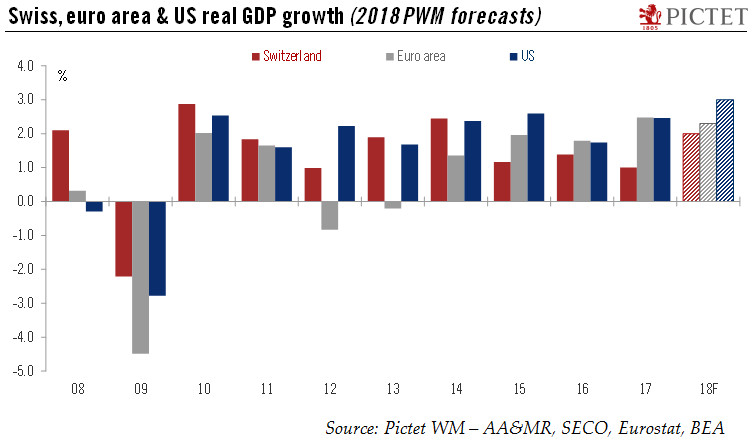The Swiss economy is gaining momentum, with growth becoming more broad based at the end of the year.Switzerland lagged the US and the euro area in terms of annual GDP growth for the third consecutive year in 2017, but today’s data confirm that the Swiss economy is continuing its recovery. Economic prospects for this year look promising. We expect growth in the Swiss economy to accelerate from 1.0% in 2017 to 2.0% in 2018, reducing the gap with other economies.According to the State Secretariat for Economic Affairs (SECO)’s quarterly estimates, Swiss real GDP rose by 0.6% q-o-q in Q4 (2.4% q-o-q annualised; 1.9% y-o-y), above consensus expectations (0.5%). The Swiss economy expanded by 1.0% in 2017 overall, in line with our own forecast. This comes after GDP growth of 1.4% in 2016 and 1.2%
Topics:
Nadia Gharbi considers the following as important: Macroview
This could be interesting, too:
Cesar Perez Ruiz writes Weekly View – Big Splits
Cesar Perez Ruiz writes Weekly View – Central Bank Halloween
Cesar Perez Ruiz writes Weekly View – Widening bottlenecks
Cesar Perez Ruiz writes Weekly View – Debt ceiling deadline postponed
The Swiss economy is gaining momentum, with growth becoming more broad based at the end of the year.

Switzerland lagged the US and the euro area in terms of annual GDP growth for the third consecutive year in 2017, but today’s data confirm that the Swiss economy is continuing its recovery. Economic prospects for this year look promising. We expect growth in the Swiss economy to accelerate from 1.0% in 2017 to 2.0% in 2018, reducing the gap with other economies.
According to the State Secretariat for Economic Affairs (SECO)’s quarterly estimates, Swiss real GDP rose by 0.6% q-o-q in Q4 (2.4% q-o-q annualised; 1.9% y-o-y), above consensus expectations (0.5%). The Swiss economy expanded by 1.0% in 2017 overall, in line with our own forecast. This comes after GDP growth of 1.4% in 2016 and 1.2% in 2015.
Two aspects of today’s report are worth mentioning. First, on the expenditure side, both domestic demand components and foreign trade helped to boost Swiss growth in 2017. Second, the largely export-oriented manufacturing sector was the main driver of GDP growth in 2017. The service sectors such as accommodation and food services and financial services also provided substantial support to growth.
